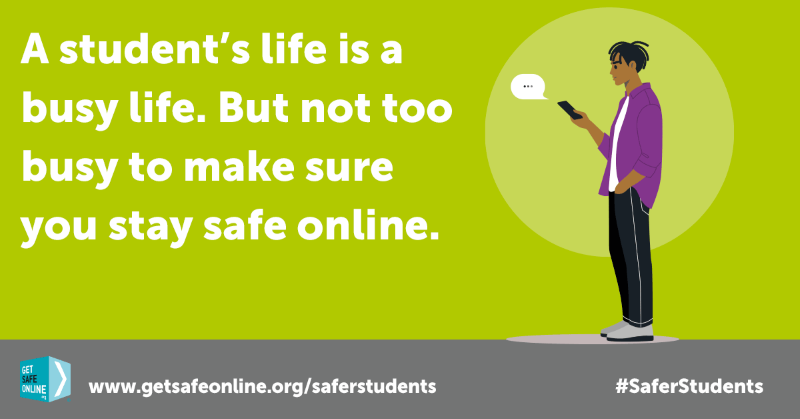Student safety online – 13 expert tips
They have outlined 13 simple tips to follow from experts to ensure a trouble-free student life online.
1. Don’t be a victim of fraud
Fraudulent texts, emails, DMs and calls claiming to be from trusted organisations are common, and overseas students are targeted by visa fraudsters too. Always think twice before clicking on a link or attachment or allowing callers access to your devices or accounts.
2. Banking
Ensure you keep banking and other financial details private and make money transfers safely via a mobile wallet or banking app. Get to know your Student Money Adviser.
3. Buying
When buying or subscribing from a website for the first time, check if it’s legit or fraudulent by using the Check a website tool on the Get Safe Online website.
4. Payments
Do avoid paying a person or company you don’t know by bank transfer for things like purchases, accommodation deposits and fees. Using a card is much safer.
5. Accommodation
Physically check in person whether the flat or room you’ve seen advertised really exists, and make sure the advertiser is authentic before parting with any money. Pay deposits and any other up-front payments by credit card for extra protection.
6. Oversharing
Keep financial and other confidential details to yourself, along with passwords and other login details. Review your location settings on phones, cameras and apps to protect your physical safety, and avoid freebies and prize draws asking for confidential data. Also remember that innocently shared intimate images can fall into the wrong hands.
7. Respect & Responsibility
There is no place anywhere, including online, for any kind of abuse, hate speech, gender-based violence, forcing views on others or criminal activity. Remember employers can check your social media profiles when they’ve got your job application.
8. Mobile devices and Wi-Fi
Ensure you protect your phone, laptop and tablet from loss or theft. If what you’re doing online when out and about is confidential or financial, steer clear of using Wi-Fi hotspots as there’s no guarantee they’re secure. Review your device, camera and app location services.
9. Gambling
Remember there’s a fine line between gaming and gambling. Betting can become a bad habit. If you’re tempted, think about the more positive things you could do with your money and time.
10. Dating
Do use a reputable app or site and keep conversations on its messaging platform. Not everyone is who they claim to be and some use online dating to commit fraud or arrange a hookup for the wrong reasons. Don’t be afraid to block or say NO!
11. If it feels wrong, don’t do it!
Don’t be put under pressure to do anything you feel uncomfortable with, like sharing intimate pics, harmful pranking, extreme content, social media hacking or any kind of extremism. Don’t put others under pressure either.
12. Too good to be true jobs
Students are favourite targets for illegal get rich quick schemes, like jobs with pay that’s too good to be true or others using your bank account to ‘process payments’. If you fall for it – even innocently – you could get a criminal record, fine or jail term.
13. Making the right cyberchoices
If you’re good at gaming or coding, you could be targeted by cybercriminals wanting your skills for malware coding or hacking. Don’t fall for it - consider a career in cybersecurity instead.
Students who do fall victim to fraud should report it at actionfraud.police.uk or by calling 101 in Scotland.
Find out more information about keeping safe online.
23 September 2024
